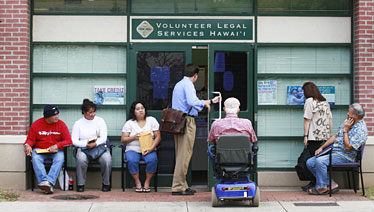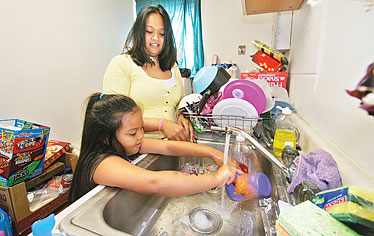 | ||||||||||||||||||
|
|
The Constitution guarantees a lawyer for anyone accused of a crime. But most low-income people in Hawaii are out of luck if they need legal help to protect their children, get a fair shake in housing or get money back after being defrauded. Volunteer Legal Services fielded more than 9,000 calls for legal help in 2007, up from 6,000 in 2003, according to Executive Director Moya Davenport Gray. The calls came from families facing eviction. They came from mothers trying to shield their children from abuse. They came from people denied government benefits. And those callers were just a small fraction of those in need, just the ones who know that Volunteer Legal Services Hawaii exists. Most people on the lower rungs of the economy do not know what help is available, much less how to get it. "There are more and more people struggling that don't show up on the radar," Gray said. "For the most part the problems of the poor are hidden. It is up to the Access to Justice Hui to bring light to the problem. We can't have a democratic society unless the courts are open to everyone." The hui, a coalition of legal service providers who work with the needy, has teamed up with heftier institutions including the Hawaii State Bar Association and the state Judiciary. Late last year it issued a report showing how few people in Hawaii can afford a lawyer when they need one -- and outlining what to do about the problem.
"As you can see from the surveys, we're not doing real well, and we need to do a heck of a lot more," Supreme Court Chief Justice Ronald Moon said in a recent interview with the Star-Bulletin. "A large sector of our population is within that low-income and gap group, and I think that when we say one out of five people receive legal assistance, that is just not adequate." When it issued its report late last year, the hui said it did not want the study to just sit on a shelf. It has not. Several of its recommendations are being translated into action. They range from bills at the Legislature to boost funding for legal aid and the supply of pro bono lawyers, to steps by the Supreme Court to establish an Access to Justice Commission and require banks to pay their fair share. "For years, everyone wanted to study whether there was a justice gap," said Robert LeClair, executive director of the Hawaii Justice Foundation, a hui member. "Finally, we've studied it enough, and everyone knows we've got a justice gap. It's time to do something about it. These are critical issues, and it's a matter of basic fairness in our society." Here are some recent steps toward expanding access to justice for the needy:
» Access to Justice CommissionThe Supreme Court plans to announce May 1 the creation of an Access to Justice Commission to "substantially increase access to justice in civil legal matters for low- and moderate-income residents of Hawaii." It would include a justice of the Supreme Court, other judges, the governor and attorney general or their representatives, leaders of the state Senate and House or their designees, as well as legal service providers."The hui is a voluntary group," Gray said. "The commission would have the force of the Supreme Court's imprimatur. It would be a body that would provide leadership and continuity."
» Boosting bank paymentsThe Supreme Court recently proposed a rule that could double the interest income paid by banks that goes to support legal services for the poor. It would require banks to pay the same rate of interest on Lawyers Trust Accounts that is paid on comparable accounts.Lawyers Trust Accounts pool clients' funds that are too small or short term to generate net interest on their own. Such accounts have been earning less than 1 percent a year in Hawaii banks, generating about $600,000 annually. In other states the amount generated doubled or tripled after comparability was required, LeClair said.
» Court filing feesAt the Legislature, a bill (HB3422, HD2, SD1) to increase court filing fees to fund indigent legal services passed both the House and Senate, and is now in conference committee.
» Pro bono attorneysLegislators passed a bill (HB2391, HD1) to allow lawyers who work for the state attorney general to do pro bono work after hours, if it does not pose a conflict of interest. Gov. Linda Lingle vetoed it Monday, saying the attorney general should have the discretion to decide whether a conflict exists. Lawmakers could override the veto.The federal Department of Justice encourages its attorneys to do pro bono work that does not conflict with their official duties. But state Attorney General Mark Bennett testified against letting state attorneys do the same, saying that almost any legal service they might provide off duty could create a conflict of interest.
» Better reportingThe Supreme Court recently began requiring all lawyers in the state to report the number of hours they donate in free legal services. Preliminary estimates from the Hawaii State Bar Association show the percentage of lawyers donating time went up to 47 percent last year from an average of about 27 percent during years when reporting was voluntary, and the total number of hours given doubled to roughly 200,000.These moves are heartening to those on the front lines. "This is the most interest in access to justice that I've ever seen," said LeClair. "We're optimistic."
He lives in Moanalua with his mother on his Social Security disability payments. More than a year ago, those payments were cut by nearly a third when the government began deducting $427 a month in child support for a girl in California he did not know existed. They told him he owed more than $30,000 in back payments. Gorai had no say in the matter. He never received notice of the case, but was found liable by default when he did not appear in court. He had no idea how to fight the ruling or contact the woman who claimed she had his child. He got nowhere when he tried to contest it himself. "I didn't know what to do," he said. "I had no money. I needed help. I needed a lawyer. That's when I called Legal Aid and Volunteer Legal Services Hawaii." A volunteer lawyer went to bat for him. After numerous hearings and futile attempts to contact the woman in California, the government stopped docking his check in March. On April 11 the paternity claim against him was dismissed. "I wouldn't be where I am today without a lawyer," he said. "My life is much better now. Now I got something in my pocket, which isn't much, but I got to live with it. If more lawyers helped out, people like me wouldn't be suffering." The Access to Justice Hui believes that citizens should have a right to a lawyer when basic human needs are at stake. It cites a resolution recently passed by the American Bar Association supporting "legal counsel as a matter of right at public expense to low-income persons in those categories of adversarial proceedings where basic human needs are at stake, such as those involving shelter, sustenance, safety, health or child custody." Asked what he thought of that proposal, Moon responded: "I think that's the ultimate goal that we should be striving for, but I think it's very unrealistic with the economy the way it is. ... Hopefully we can put a large dent into that problem by what the commission will be doing in getting the community together to fund the legal service providers as well as convincing the Legislature that they should be appropriating more money for these purposes."
© Honolulu Star-Bulletin -- https://archives.starbulletin.com
| Tools
| ||||||||||||||||
 | ||||||||||||||||||





